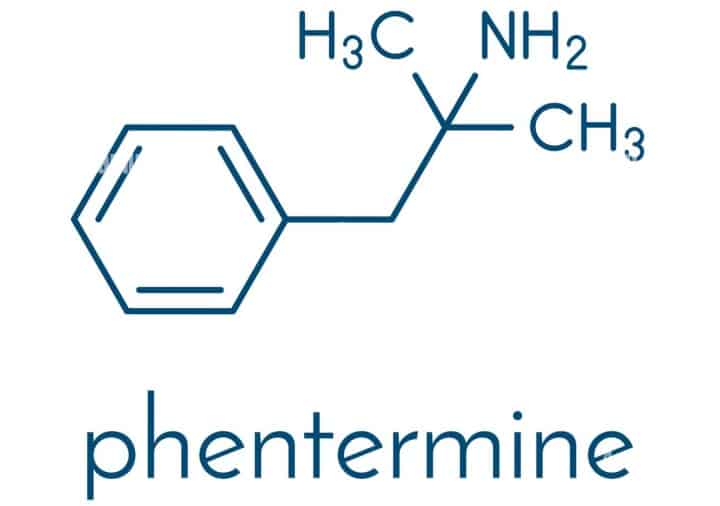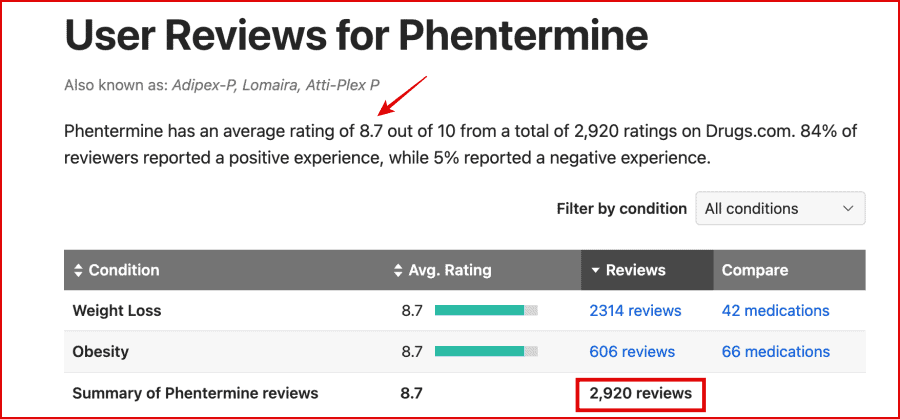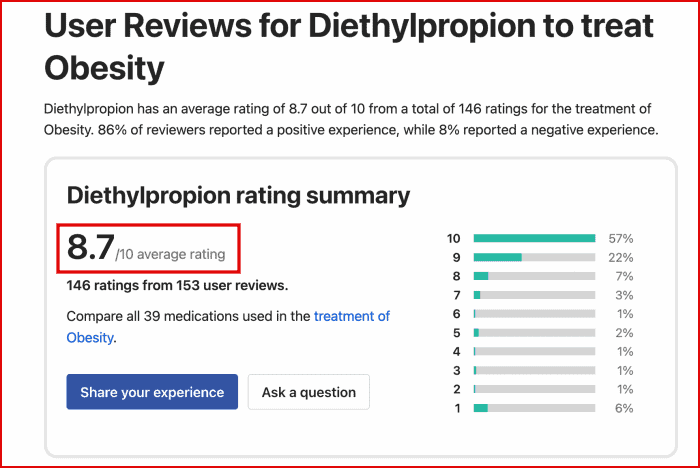Phentermine vs Diethylpropion: what’s better? (taken together?)
Max Health Living is a reader-supported site. Purchases made through links may earn a commission. Learn more.
Phentermine is considered better than diethylpropion since it is cheaper and more effective than it. Moreover, it can be prescribed to you if you suffer from certain other diseases with obesity.
Is consistently dragging yourself to the gym or choking your cravings not helping you achieve that healthy weight?
Then, it is high time that you visit your doctor and take his recommendation on prescribing you an anti-obesity drug such as phentermine or diethylpropion to aid your weight loss progress.
Both phentermine and diethylpropion are appetite suppressants, but they differ from each other on the basis of their efficacy, dosage forms, and their suitability in different conditions.
Thus, in this article, I will discuss the benefits, safety, user reviews, cost, and a summary of all the pros and cons of these two drugs to help you better understand the two possible treatment options your doctor may prescribe you.
So, head down below to find out all this and more.
What is Phentermine?
Phentermine is an FDA-approved, short-term (12-week) weight loss treatment.

Phentermine is included in the class of drugs called anorectics. It is basically a substituted amphetamine, and thus, the FDA classifies it as a Schedule IV drug.
Your doctor may prescribe this drug if you have a Body Mass Index (BMI) of over 30 kg/m2. Or if you have a BMI over 27 kg/m2 and are co-morbid with other diseases like high blood pressure, diabetes, or high cholesterol.
This weight-loss treatment secured FDA approval in 1959, and it is available under the brand names Adipex-P, Obenix, Phentride, Teramin, Lonamin, or Sentis.
Phentermine is a sympathomimetic amine. Thus, it stimulates the sympathetic nervous system to trigger the release of catecholamines and prevents their reuptake.
These catecholamines are dopamine, epinephrine, and norepinephrine. It is also suspected to have a weak effect on serotonin. High levels of these neurotransmitters in the brain suppress the appetite and also cause increased energy levels.
Phentermine is available in the form of tablets, capsules, and extended-release capsules. Its dosage ranges between 4 mg to 40 mg.
The dosage regime of phentermine varies a lot.
The lower doses like 8mg or 4mg tablets are prescribed three times a day, 30 minutes before every meal. And the 15mg and 20 mg tablets are to be taken approximately two hours after breakfast.
For some patients taking 18.75 mg tablets once or twice a day seems to work best.
But for best results, your doctor may recommend that you take 37.5 mg tablets first thing in the morning. You may also take it one or two hours after breakfast.
However, you should avoid taking it late in the evening since it has the potential to cause insomnia.
What is Diethylpropion?
Diethylpropion is also an appetite suppressant that is prescribed as a short-term course (12 weeks) for treating exogenous obesity.

It also belongs to the class of drugs known as anorectics or anorexigenics. It is a structural analog of amphetamine and is classified as a Schedule IV controlled substance.
Your doctor may add this anti-obesity drug to your weight loss regime to support your diet and exercise if they alone are not rendering any results and if you have a Body Mass Index (BMI) of more than 30 kg/m2.
The US FDA approved diethylpropion in the same year as phentermine in 1959 to counter obesity.
However, the FDA later withdrew its approval in 2007.
Its different brand names, such as Tenuate, Tenuate Dospan, or Tepanil, have also been discontinued in the United States by the FDA. However, its FDA-approved generic versions might still be available in the market, such as the generic version of Tenuate by CorePharma.
Again, similar to phentermine, diethylpropion is also a sympathomimetic amine. It stimulates the neurons to release catecholamines such as dopamine and norepinephrine in the brain while simultaneously preventing their reuptake. And this exerts an appetite suppressing effect.
Neuropeptide Y is a hormone that promotes eating, increases fat storage, and decreases energy expenditure. But the high levels of catecholamines suppress this hormone and counter its effects.
Moreover, diethylpropion may also indirectly increase the levels of another hormone, leptin, which promotes the feelings of satiety.
Diethylpropion hydrochloride is available in oral dosage forms in either 25 mg extended-release tablets or 75 mg-controlled release tablets.
Your doctor may recommend you to take the 25 mg tablets 1 hour before every meal. And if you want to overcome late-night cravings and hunger, then take it late in the evening.
On the other hand, the 75 mg tablets are to be taken only one time a day in mid-morning.
Phentermine vs Diethylpropion – Which one’s safer?
I hope that the above section familiarized you with both drugs’ general information, such as their function, mechanism of action, and dosage regimes.
So, in this section, I will compare both drugs and provide you with my opinion on which drug has more benefits, an established safety profile, and better user reviews.
In the end, you’ll find a summary of all the pros and cons to help you choose the better drug based on your own judgment as well.
1. Benefits of phentermine and diethylpropion
- Phentermine benefits
Phentermine helps to suppress appetite. It increases resting energy expenditure, and it also promotes mental alertness.
A single dose between 30 mg to 37.5 mg is enough for the whole day.
- Diethylpropion benefits
Diethylpropion helps in appetite suppression, and you can take it late to keep away night hunger if you want.
Verdict: Phentermine seems better since both the drug have a similar effect, but phentermine does the work with a lower dose.
2. Safety
Phentermine Safety
Phentermine is generally considered safe if consumed according to the doctor’s instructions.
However, it does carry some risks with its use and comes with certain precautions.
Thus, this section will tell you about the potential drug interactions of phentermine, its possible side effects, and safety during pregnancy and nursing in different ages and health conditions.
- Phentermine Drug Interactions
Phentermine is known to have drug interactions with about 170 different drugs, and out of these, 42 are major interactions, 126 are moderate, and 2 are minor interactions.
For instance, it is reported to cause a severe adverse reaction if taken with SSRI antidepressants, MAO inhibitors, or other anorectic agents. However, it can be prescribed as both a monotherapy or a combination therapy.
Taking phentermine within 14 days of treatment with MAO inhibitors may cause severe consequences. Moreover, it should not be prescribed to patients who have a history of drug abuse.
- Phentermine is not Entirely Safe for all
Phentermine is not recommended for ages less than 16 years and should be prescribed under strict monitoring to the older population that is of more than 65 years of age.
Moreover, it is recommended to up-titrate the dose in older people as their organ function may get affected if the treatment is started with higher doses.
- Contraindicated with Other Illnesses
Phentermine is contraindicated with 17 different underlying illnesses.
These could be cardiovascular disease, hyperthyroidism, psychotic disorders, seizures, renal dysfunction, etc.
Phentermine is included in the pregnancy category C, which means that it has been shown to cause fetal defects in animal studies, and there are no human studies to prove otherwise.
Thus, it should be avoided during pregnancy, especially in the first trimester. The safety of phentermine in nursing mothers is unknown, so it is better to avoid it.
- Drug Abuse Potential
Phentermine is suspected of having potential for abuse, and there are reports that it causes adverse effects like depression and headache when discontinued abruptly.
- Numerous other safety concerns
Phentermine may cause general side effects such as insomnia or headache. It may also affect the nervous system and cause dizziness and fatigue.
Some commonly reported side effects are allergic and skin reactions like hives, rashes, and gastrointestinal side effects, including constipation, nausea, dry mouth, or vomiting.
Severe side effects may include cardiovascular side effects, like an increased heartbeat or elevated blood pressure.
Users have also reported psychiatric side effects like psychosis and depression.
In rare cases, it may affect the genitourinary tract and cause problems in urination.
Diethylpropion Safety
Diethylpropion should only be used under the doctor’s approval and supervision due to the risks associated with its treatment.
Thus, this section will brief you on the drug interactions and other general side effects of diethylpropion. We’ll also discuss its safety in different age groups, with underlying illnesses, and during pregnancy and breastfeeding.
- Diethylpropion Possible Drug Interactions
160 drugs are reported to interact with diethylpropion, and out of them, 42 interactions are characterized as major, 116 as moderate, and 2 as minor interactions.
For instance, it is contraindicated with similar anorectic drugs such as phentermine. Or MAO inhibitors (depression medicines) like Marplan. Or with antibiotics like linezolid, etc.
Moreover, it is recommended for use as monotherapy only.
Diethylpropion is not safe for everyone
It should not be prescribed to people with food allergies to dyes, preservatives, animals, etc.
Its safety and efficacy in children below 16 years of age are not established yet.
And it comes under precaution for geriatric use (for use in older people, typically 65 years or older) because it is substantially excreted by the kidney and poses a greater risk of renal function impairment in older adults.
Moreover, it should not be used by people with any of the following 15 underlying diseases:
- Hyperthyroidism
- Liver disease
- Kidney impairment
- Mental diseases like bipolar disorder
- Hypertension
- and some other cardiovascular diseases
- Not for Pregnant Ladies
Diethylpropion is included in pregnancy category B, which means it has been found safe in animal studies but lacks controlled studies in pregnant women.
Thus, it should only be used during pregnancy if no other choice is available (still highly undesirable, if you ask me). However, it is secreted in breast milk, so nursing mothers should avoid it.
- Risky if Diethylpropion is taken for long
In order to prevent unreasonable risk and exposure, it is recommended that you don’t pursue Diethylpropion treatment if there is no visible weight loss progress (lose at least around 4 pounds) within the first four weeks of treatment.
This treatment regime carries the risk of causing psychological dependence, drug abuse, and social dysfunction in patients.
Its abrupt cessation following a high dosage schedule may cause severe side effects like depression and fatigue.
The list of side effects and withdrawal symptoms caused by diethylpropion can keep going on and on.
These adverse reactions could affect the cardiovascular system, central nervous system, gastrointestinal system, endocrine system, and hemopoietic system (in other words, it may affect the formation of the blood’s cellular components).
It may also cause allergic reactions and other generalized side effects like hair loss and increased sweating.
However, some common adverse effects caused by diethylpropion may include skin disease, anxiety, headache, rash, dry mouth, nausea, vomiting, thirst, constipation, and insomnia.
And some rare and more severe side effects include irregular heartbeat, pulmonary hypertension, defect in heart valves, and acute psychosis.
Verdict: Phentermine and diethylpropion cannot be compared on the basis of their safety since they have a similar safety profile. Their common side effects are often mild or moderate.
And thus, your doctor may prescribe the drug that suits your condition better.
3. User reviews
Phentermine Reviews
2,920 users rated phentermine on drugs.com, and its average rating came out to be 8.7 out of 10. As of when writing this.

Moreover, 83% of the users wrote positive reviews, and 5% of them gave negative reviews about the drug on the website.
According to user reports, phentermine may help you lose 3 to 5 pounds per month.
A meta-analysis compared six Randomized Control Trials and concluded that patients who took phentermine lost an average of 3.6 kg additional weight compared to the placebo group.
A 16-week double-blinded control trial of 70 obese patients found that treatment with phentermine induces a more significant weight loss than the placebo.
The researchers noted that the phentermine group lost 16 pounds, whereas the placebo group lost only 4 pounds.
Diethylpropion Reviews
Only 146 users have rated diethylpropion on drugs.com, which comes out to be an average rating of 8.7 out of 10 for the drug.
Moreover, there are 86% positive reviews and 8% negative reviews about the drug on the website.

As the testimonials suggest, diethylpropion should help you lose at least 4 pounds in the first month of treatment.
A meta-analysis compared 13 Randomized Control trials on diethylpropion. And according to it, participants on diethylpropion lost 3 kg more than the placebo group.
According to a 2009 clinical trial, after six months, participants taking diethylpropion had an average weight loss of 9.8% of their initial body weight compared to only 3.2% average weight loss in the participants receiving a placebo.
Moreover, according to the study, the mean weight loss with diethylpropion came out to be 10.6%.
Verdict: Phentermine seems to be the winner. The reason is that although both drugs cause approximately the same weight loss progress per month, phentermine has fewer negative reviews and more user feedback under its name.
4. Cost of Phentermine and Diethylpropion
Phentermine Cost
According to Goodrx, 30 tablets of 37.5 mg phentermine (generic) have an average retail price of around $36.9. You can also read our post on the cost of phentermine without insurance to see its prices in every shop worldwide.
Diethylpropion Cost
On the other hand, according to the same website, 30 tablets of 75 mg diethylpropion (generic) have an average retail price of around $47.52.
Whereas its one-month supply (30 tabs) of 25 mg tablets has an average retail price of $21.37
Verdict: Phentermine seems to be less costly. The reason is that 30 tablets of its maximum dose (37.5 mg) can last a whole month and is cheaper than both the high and low doses of diethylpropion.
5. Pros and cons (final summary)
Phentermine Pros
- It helps to suppress appetite.
- It gives an energy boost.
- It is prescribed to treat obesity in co-morbid patients.
- It can be used both as a monotherapy or as a combination therapy.
- It can be taken either with or without food.
- Doses above 30 mg are only prescribed one time a day.
- It is cost-effective.
Phentermine Cons
- It should be combined with diet and exercise modifications.
- It is a Schedule IV controlled drug.
- It can only be bought on a doctor’s prescription.
- It has a risk of causing insomnia and thus should be avoided at night.
- It cannot be bought online.
- It is only a short-term treatment (12 weeks).
- Patients may develop tolerance to it.
- It does not help to keep weight off or maintain weight.
- It is prescribed for individuals above 16 years of age.
- It is contraindicated with certain diseases.
- It causes side effects.
- It is included in pregnancy category C and is not safe during pregnancy.
- It is not recommended for nursing mothers.
- It may cause dizziness, so tasks requiring mental alertness should be avoided.
- It is suspected to be habit-forming.
- It should not be prescribed to people with a history of drug abuse.
- It is contraindicated with 170 drugs.
- It is reported to have 17 disease interactions.
- Alcohol and caffeine products should be avoided while on phentermine.
- It should not be prescribed for certain underlying diseases.
Diethylpropion Pros
- It decreases appetite.
- It helps to overcome night hunger.
- Its 75 mg tablet is only prescribed one time a day.
- It is included in pregnancy category B and can be prescribed if clearly needed.
Diethylpropion Cons
- It should be taken along with proper diet and exercise.
- It is prescribed for the short term only (12 weeks).
- You may develop tolerance to it.
- It cannot be bought online.
- It is a Schedule IV controlled substance.
- It is available only on a doctor’s prescription.
- It requires dose adjustments depending on the patient’s condition, history, and drug response.
- The patient should only continue treatment if he observes satisfactory weight loss.
- You may form a Habit of it.
- It is not approved for ages less than 16 years.
- The 25 mg tablet has to be taken before every meal (approx. three times a day).
- It comes with geriatric precautions.
- It should be prescribed to nursing mothers under caution.
- It is contraindicated with 160 drugs.
- It may show drug interaction with alcohol and tobacco.
- It may interact with 15 kinds of underlying diseases.
- It is not suitable for individuals who are allergic to amphetamines.
- It has specific food interactions.
- It is not recommended for people with a history of drug abuse.
- It is preferred as a monotherapy.
- Activities requiring mental alertness should be avoided with it.
- Its different brand names are discontinued in the US.
- It May cause withdrawal symptoms.
Verdict: Phentermine seems to be the winner because diethylpropion appears to have a higher risk-to-benefit ratio than phentermine.
Also read: Phentermine vs Saxenda: Which is safer?
FAQs on Phentermine vs Diethylpropion
Is diethylpropion better than phentermine?
No, in fact, phentermine is better than diethylpropion. This can be proved by the results of a clinical trial that was performed to compare the tolerance and effectiveness of diethylpropion and phentermine.
It found that phentermine promoted more significant weight loss as compared to diethylpropion. And it also helped to reduce the heart rate and blood pressure of the patients.
What is the difference between diethylpropion and phentermine?
Both diethylpropion and phentermine are appetite suppressants but differ in that the former is recommended as a monotherapy, whereas the latter can be taken as both a monotherapy and combination therapy.
Moreover, diethylpropion is not specifically recommended for co-morbid obesity patients, whereas phentermine is recommended for patients who have a BMI over 27kg/m2 and are suffering from specific comorbidities. (but still, only the doctor can decide what’s best for you)
Another difference is that phentermine is a pregnancy category C drug, whereas diethylpropion belongs to FDA pregnancy category B.
Where can I buy phentermine and diethylpropion?
Both of these are prescription drugs and can only be bought on prescription from pharmacies, healthcare providers, or private slimming clinics.
Can you take diethylpropion with phentermine?
No, you can not take any two anorectics such as phentermine or diethylpropion together.
Does diethylpropion give you energy?
Yes, since diethylpropion is a central nervous system stimulant, it may increase your energy levels while simultaneously suppressing your appetite.
Is Diethylpropion like Adderall?
Yes, Adderall is a mix of four amphetamine salts. And diethylpropion is also a structural analog to amphetamine.
Why is diethylpropion a controlled substance?
Diethylpropion is a Schedule IV control substance because it has stimulant properties, has a potential for abuse, and can cause drug tolerance and withdrawal symptoms.
Does diethylpropion work for weight loss?
Yes, diethylpropion helps to induce weight loss in most people. It can be pursued as an effective weight loss treatment if it causes you to shed at least 4 pounds in the first four weeks.
Final Thoughts
In a nutshell, clinical evidence vouches for phentermine as a better weight loss drug than diethylpropion. However, it might not necessarily be the best treatment option in your case.
The reason is that your doctor may consider multiple aspects before prescribing you a treatment. For instance, they will thoroughly evaluate your medical history.
Or they may check the drug’s contraindications because both phentermine and Diethylpropion are Schedule IV control substances, and they carry the risk of dependence and may cause side effects.
Phentermine is generally the preferred drug because it causes the same weight loss effects but at a lower dosage.
Moreover, it can be administered in patients that are co-morbid with other diseases with obesity.
On the other hand, diethylpropion is the safer drug option if you are in dire need of losing weight during pregnancy.
Nonetheless, no matter what the treatment option, you need to incorporate certain modifications in your lifestyle, diet, and daily physical activity to get results.
Plus, do not self-medicate yourself with prescription drugs and observe their treatment under your doctor’s supervision.
Important Disclaimer: The information contained on MAX HEALTH LIVING is intended for informational and educational purposes only. Any statements made on this website have not been evaluated by the FDA and any information or products discussed are not intended to diagnose, cure, treat, or prevent any disease or illness. Please consult a healthcare practitioner before making changes to your diet or taking supplements that may interfere with medications.
Who We Are

We are a team of fitness, health, and supplement experts, and content creators. Over the past 4 years, we have spent over 123,000 hours researching food supplements, meal shakes, weight loss, and healthy living. Our aim is to educate people about their effects, benefits, and how to achieve a maximum healthy lifestyle. Read more.



